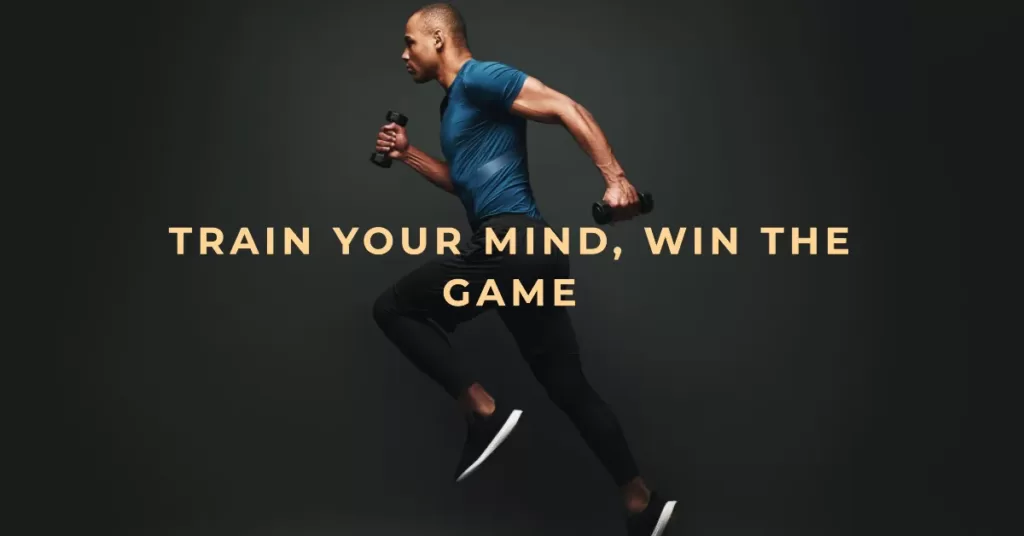As an athlete, you know that your mindset plays a vital role in your performance. Whether you’re competing at the highest level or just starting out, your mental state can make all the difference between success and failure. That’s why it’s crucial to develop a growth mindset and overcome any limiting beliefs that may be holding you back.
Mindset training is a powerful tool that can help athletes of all levels improve their performance by strengthening their mental game. By learning how to cultivate a positive attitude, visualize success, and use positive self-talk, you can boost your confidence, focus, and resilience on and off the field. In this article, we’ll explore some of the essential elements of mindset training for athletes and show you how to integrate them into your athletic routine for maximum impact.
Table of Contents
Key Takeaways
- Mindset training improves performance and develops a winning attitude and mental toughness.
- Athletes become better equipped to handle pressure, setbacks, and challenges, and are less affected by negative self-talk or distractions during competitions.
- Mindset training increases confidence and motivation, and helps athletes focus on what they can control while embracing challenges as opportunities for growth.
- Techniques such as visualization, mental rehearsal, and mindfulness practices can enhance cognitive abilities and help build resilience and grit in athletes.
Understanding the Importance of Mindset Training for Athletes
If you want to take your athletic performance to the next level, it’s crucial to understand why mindset training can make all the difference. The way you approach your sport mentally can have a significant impact on your success. Mindset training involves learning how to develop a winning attitude and mental toughness that will help you overcome obstacles and perform at your best.
Athletes who train their minds are better equipped to handle pressure, setbacks, and challenges. They are less likely to be affected by negative self-talk or distractions during competitions. Mindset training teaches athletes how to focus on what they can control while letting go of things outside of their control. This perspective allows them to stay present in the moment and perform at their highest level.
Furthermore, developing a positive mindset can lead to increased confidence and motivation. When athletes believe in themselves and their abilities, they are more likely to set challenging goals and work hard toward achieving them. A strong mindset also helps athletes bounce back from failures quickly by viewing them as opportunities for growth rather than setbacks.
Understanding the importance of mindset training is essential for any athlete looking to improve their performance. By cultivating a positive attitude, focusing on what is within their control, and bouncing back from failure quickly through mental toughness techniques like visualization exercises or meditation sessions – athletes can achieve greater levels of success both on and off the field/court/track/pool/etc.!
Developing a Growth Mindset

To develop a growth mindset, you must embrace challenges and view them as opportunities for growth. You should also learn from failure and use it to improve yourself. Finally, believe in the power of dedication and hard work as the keys to achieving success in all areas of your life. By adopting these principles, you can cultivate a mindset that will help you overcome obstacles and reach your full potential as an athlete.
Embracing Challenges
You’ve got to face challenges head-on and embrace them as opportunities for growth. In sports, challenges are inevitable – whether it’s facing a tough opponent or recovering from an injury. But instead of shying away from these obstacles, you can use them to your advantage by viewing them as chances to improve and develop your skills.
One way to approach challenges is by using the table below as a guide. On the left column, write down the challenge you’re facing – whether it’s mental or physical. Then in the right column, list down what you can learn or gain from overcoming that challenge. By doing this exercise regularly, you’ll start to see that even the toughest challenges have something positive to offer and that they’re not something to fear but rather embrace with open arms. Remember that every obstacle is an opportunity in disguise!
| Challenge | Opportunity |
|---|---|
| Losing a game | Learn how to bounce back stronger |
| Dealing with an injury | Develop mental toughness and patience |
| Facing a strong opponent | Improve your own skills and strategy |
So don’t be afraid of challenges – welcome them as friends who are there to help you grow and succeed in your athletic pursuits!
Learning from Failure
Learning from failure is like a seed that must first be buried before it can grow into a beautiful flower. As an athlete, you will encounter moments of defeat and disappointment, but it’s important to remember that these setbacks are not the end of your journey. In fact, they are opportunities for growth and improvement.
Instead of dwelling on the negative emotions that come with failure, use them as motivation to push yourself harder. Analyze what went wrong and identify areas in which you can improve. Remember that every mistake is a chance to learn something new about yourself and your abilities. By embracing failure as part of your journey, you’ll develop a stronger mindset and become more resilient in the face of challenges. Keep pushing forward and trust that with each setback comes an opportunity for growth and success.
Believing in the Power of Dedication and Hard Work
If you truly believe in the power of dedication and hard work, nothing can stand in your way as you push through obstacles and make progress toward your goals. It’s important to understand that success is not just about talent or luck. It’s about perseverance and tenacity. You must be willing to put in the time, effort, and energy required to achieve your objectives.
When it comes to mindset training for athletes, one of the key lessons is to believe in yourself. Dedication and hard work are inseparable from this belief. You must have faith in your abilities and be willing to do whatever it takes to succeed. This means embracing challenges, pushing yourself beyond your limits, and never giving up on your dreams. Remember that every great athlete was once a beginner who decided to dedicate themselves fully to their craft.
Identifying and Overcoming Limiting Beliefs
Although it may be difficult, you must acknowledge and confront your limiting beliefs in order to achieve success as an athlete. These beliefs hold you back from reaching your full potential, and they can come from a variety of sources such as past experiences or external influences. It’s important to identify these beliefs so that you can work on overcoming them.
- Identify the belief: The first step is to recognize what limiting belief is holding you back. This may require some introspection and reflection on past experiences or conversations with a coach or mentor. Once you have identified the belief, write it down and examine how it has affected your performance in the past.
- Challenge the belief: Now that you have identified the belief, it’s time to challenge it. Ask yourself if this belief is really true or if it’s just something that has been ingrained in your mind over time. Look for evidence that contradicts this belief and use positive affirmations to replace negative self-talk.
- Take action: Finally, take action to overcome your limiting beliefs by setting goals and taking small steps toward achieving them. Surround yourself with positive influences such as supportive teammates or coaches who believe in your abilities. Remember that changing your mindset takes time and effort, but with dedication and hard work, anything is possible.
Identifying and overcoming limiting beliefs is essential for achieving success as an athlete. By recognizing these beliefs, challenging their validity, and taking action toward change, you can break free from negative thought patterns that hold you back from reaching your full potential on the field or court. Don’t let limiting beliefs control your performance – take charge of your mindset today!
Practicing Visualization Techniques
Practicing visualization techniques can help you mentally prepare for competition and improve your overall performance on game day. Visualization involves creating a mental image of yourself successfully executing a specific skill or task, such as hitting a home run or sinking a game-winning shot. By visualizing success, you are training your brain to perform at its highest level when it matters most.
One effective visualization technique is called “mental rehearsal”. This involves not only visualizing the desired outcome but also immersing yourself in the experience by engaging all of your senses. For example, if you are a basketball player, close your eyes and imagine yourself on the court: feel the ball in your hands, hear the sounds of sneakers squeaking on the floor, smell the sweat in the air. The more vividly you can imagine yourself in this scenario, the more effective this technique will be.
Another helpful visualization tool is creating a mental highlight reel. This involves replaying past successes in your mind to build confidence and remind yourself that you are capable of achieving great things on game day. In addition to reliving successful moments from past games or competitions, try to visualize future successes as well. Imagine yourself performing flawlessly and feeling confident and focused throughout the entire event.
To make it easier to incorporate visualization into your routine, try using a table like this:
| Day/Time | Visualization Exercise |
|---|---|
| Every morning | Spend 5 minutes visualizing one successful play from the last game |
| Before practice | Use mental rehearsal technique to visualize a perfect execution of three key skills |
| Night before competition | Create a mental highlight reel by replaying past successes |
By incorporating these visualization exercises into your daily routine, you can train both your mind and body for success on game day. Remember that like any skill, visualization takes practice and patience – but with dedication and persistence, it can become an invaluable tool for improving athletic performance.
Using Positive Self-Talk

When it comes to using positive self-talk, replacing negative thoughts with positive affirmations is key. By consciously shifting your focus from what you can’t do to what you can do, you’ll be able to build resilience and mental toughness. With practice, positive self-talk can become a powerful tool in your mental training arsenal.
Replacing Negative Thoughts with Positive Affirmations
By incorporating positive affirmations into your daily routine, you can replace negative thoughts and cultivate a more resilient mindset as an athlete. Positive affirmations are statements that are repeated to oneself in order to create positive beliefs about oneself and one’s abilities.
Here are three ways you can use positive affirmations to improve your mindset:
- Start your day with positive affirmations: Before you begin your training or competition, take a few minutes to say some positive affirmations out loud. This will help set the tone for the rest of your day and remind you of your strengths.
- Use affirmations during difficult moments: When faced with challenges or setbacks, it’s easy to fall into negative self-talk. Instead, use positive affirmations to reframe the situation and remind yourself that you can overcome it.
- Create personalized affirmations: Think about areas where you might struggle or feel insecure as an athlete, and create personalized affirmations that address those specific issues. For example, if you struggle with confidence during competition, create an affirmation like “I trust my abilities and perform at my best under pressure”.
By consistently using positive affirmations in these ways, you’ll gradually rewire your brain to think positively about yourself and your abilities as an athlete. With time and practice, this will become second nature, allowing you to approach challenges with confidence rather than fear or doubt.
Building Resilience and Mental Toughness
Building resilience and mental toughness is like forging a strong shield that can withstand any challenge thrown your way. It is about developing the ability to bounce back from setbacks, stay focused under pressure, and not be discouraged by failure. Mental toughness is not something you are born with; it is a skill that can be developed through mindset training.
To build resilience and mental toughness, you need to adopt a growth mindset. This means embracing challenges as opportunities to learn and grow, rather than seeing them as threats or obstacles. You also need to cultivate grit, which is the perseverance and passion for long-term goals. Grit involves setting high standards for yourself, pushing through discomfort and pain, and never giving up on what matters most to you.
Here’s a table that showcases some examples of how building resilience and mental toughness can help athletes overcome common challenges:
| Challenge | Resilience/Mental Toughness Strategy |
|---|---|
| Injury | Focus on rehabilitation instead of dwelling on the setback |
| Competition nerves | Use positive self-talk to stay calm and confident |
| Failure | Learn from mistakes instead of being discouraged by them |
By adopting these strategies in your mindset training, you can develop the resilience and mental toughness needed to achieve success in sports (and beyond). Remember: building a strong shield takes time and effort, but the end result will be worth it when you are able to face any challenge with confidence.
Integrating Mindset Training into Your Athletic Routine
Incorporating mindset training into your athletic routine can give you an edge over your competition and improve your overall performance. But how do you go about doing it? One way is to start by setting clear goals and intentions for each practice or competition. This will help you stay focused on what you want to achieve and give you a sense of purpose.
Another important aspect of integrating mindset training into your athletic routine is learning how to manage stress and anxiety. This can be accomplished through various techniques such as deep breathing, meditation, visualization, and positive self-talk. By practicing these skills regularly, you’ll be better equipped to handle the pressure of high-stakes situations and perform at your best.
It’s also essential to cultivate a growth mindset when it comes to your athletic abilities. Instead of viewing failures or setbacks as permanent roadblocks, see them as opportunities for growth and learning. Adopting this approach will help you stay motivated in the face of challenges and continue improving over time.
Remember that mindset training is an ongoing process that requires consistent effort and focus. Make it a habit to set aside time each day for mindfulness practices or mental exercises that will enhance your cognitive abilities. With patience and dedication, incorporating mindset training into your athletic routine can transform how you perform and how you approach life in general.




